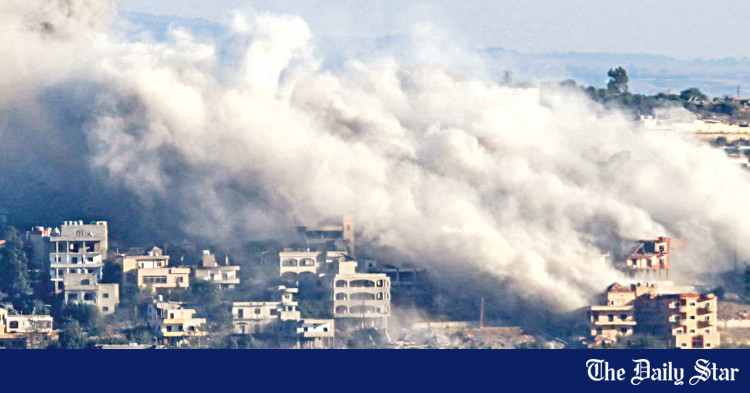Saif
Senior Member
- Messages
- 14,830
- Reaction score
- 7,674
- Origin

- Residence

- Axis Group

- Copy to clipboard
- Thread starter
- #81

Hezbollah strike on Israel’s military base kills four soldiers
New Age, a Dhaka-based leading English language daily newspaper, is a major source of news of Bangladesh and international affairs
 www.newagebd.net
www.newagebd.net
Hezbollah strike on Israel’s military base kills four soldiers
Agence France-Presse. Jerusalem, Undefined 14 October, 2024, 05:07

An ambulance leaves the scene of a drone strike near the northern Israeli town of Binyamina, on October 13, 2024, amid the continuing war between Israel and Hezbollah. | AFP Photo
The Israeli military said four soldiers were killed by a Hezbollah drone strike Sunday on a military base south of Haifa, amid an escalating conflict with the Iran-backed group in Lebanon.
‘Yesterday, a UAV launched by the Hezbollah terrorist organisation hit an army base adjacent to Binyamina,’ the military said in a statement.
‘Four IDF (army) soldiers were killed in the incident and an additional seven were severely injured.’
Earlier Sunday, the Lebanese militant group Hezbollah, which is at war with Israel, said it had launched ‘a squadron of attack drones’ at a military training camp in Binyamina, south of Haifa, in response to Israeli air strikes on the country.
The incident comes two days after air raid sirens sounded in central Israel after two aerial drones entered the country from Lebanon. At least one building north of Tel Aviv was damaged during the incident.
Hezbollah has been regularly firing rockets and drones into Israel for more than a year, but has reached further since the fighting escalated in late September.
Israel's air defences, including the Iron Dome system, have intercepted most of the projectiles, with few casualties caused by strikes or falling debris.
Agence France-Presse. Jerusalem, Undefined 14 October, 2024, 05:07
An ambulance leaves the scene of a drone strike near the northern Israeli town of Binyamina, on October 13, 2024, amid the continuing war between Israel and Hezbollah. | AFP Photo
The Israeli military said four soldiers were killed by a Hezbollah drone strike Sunday on a military base south of Haifa, amid an escalating conflict with the Iran-backed group in Lebanon.
‘Yesterday, a UAV launched by the Hezbollah terrorist organisation hit an army base adjacent to Binyamina,’ the military said in a statement.
‘Four IDF (army) soldiers were killed in the incident and an additional seven were severely injured.’
Earlier Sunday, the Lebanese militant group Hezbollah, which is at war with Israel, said it had launched ‘a squadron of attack drones’ at a military training camp in Binyamina, south of Haifa, in response to Israeli air strikes on the country.
The incident comes two days after air raid sirens sounded in central Israel after two aerial drones entered the country from Lebanon. At least one building north of Tel Aviv was damaged during the incident.
Hezbollah has been regularly firing rockets and drones into Israel for more than a year, but has reached further since the fighting escalated in late September.
Israel's air defences, including the Iron Dome system, have intercepted most of the projectiles, with few casualties caused by strikes or falling debris.

 War Archive
War Archive












